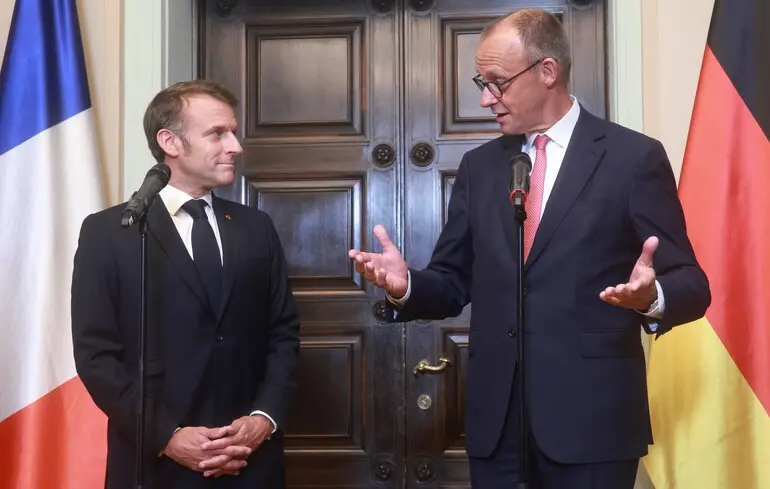Merz and Macron call for secondary sanctions against Russia’s supporters

German Chancellor Friedrich Merz and French President Emmanuel Macron announced plans for secondary sanctions targeting companies from third countries that support Russia’s war effort, as European leaders grow impatient with the stalled peace negotiations.
The initiative emerged from a meeting of German and French cabinet members on 29 August, according to Bloomberg. Both leaders called for measures to undermine Russia’s ability to finance its military operations through oil sales.
“We will continue to exert pressure for additional sanctions to be imposed by ourselves — and we are prepared to do so — but also by the US, to force Russia to return to the negotiating table,” Macron said at a joint press conference with Merz at Fort du Cap Brun near Toulon.
The timing reflects mounting frustration with President Donald Trump’s approach to ending the war. Trump’s latest two-week deadline for progress is close to expiring with little visible advancement toward a peace deal. Instead, the Kremlin launched one of its heaviest drone and missile assaults of the year this week, hitting apartment buildings and killing at least four children.
Merz specifically referenced potential US tariffs as a model for action. “In America, right now they’re discussing further tariffs,” he said. “I would welcome it very much if the American government could make a decision on enforcing those on other nations whose purchases of oil and gas finance a large part of Russia’s war economy.”
The Franco-German statement outlined plans to “further extend and develop effective and robust sanctions” through cooperation within the European Union and with Group of Seven partners. The stated goal is to “exert maximum pressure on Russia.”
The EU has already begun preparing secondary sanctions aimed at Russia’s energy sector. These measures target third countries that help the Kremlin circumvent existing penalties, with additional steps planned for Russia’s oil, gas, and financial sectors.
“We are working on the next package, there are several options on the table,” EU foreign policy chief Kaja Kallas said. “Of course, what will hurt them the most is any sanctions on energy and secondary sanctions.”
The EU adopted an anti-circumvention tool in 2023 that prohibits exports, supply, or transfers of certain goods to third countries considered to aid sanctions evasion. However, the bloc has not yet deployed this instrument.
The EU has avoided secondary sanctions, particularly given recent criticism from the Trump administration about such policies. The current push suggests European leaders believe they have reached the limits of direct sanctions against Russia.
Merz has become increasingly vocal about the lack of diplomatic progress. The German leader said on 28 Augusthe no longer expects a meeting between Putin and Ukrainian President Volodymyr Zelenskyy, despite Trump’s previous suggestions that such talks were possible.
Beyond sanctions, France and Germany agreed to provide Ukraine with “credible security guarantees” that would allow the country to maintain a military “without any limitations” to deter Russia. They also committed to closer defense cooperation and standardizing military equipment between their nations.
The two countries plan to discuss including France’s nuclear weapons in Europe’s overall security architecture, though they postponed a final decision on the troubled FCAS fighter-jet project until year-end.
Kallas indicated broad support among EU defense ministers for expanding the mandate of EU training missions after a ceasefire, allowing training to occur inside Ukraine rather than just outside its borders.
Zelenskyy said he and European leaders will “connect” with Trump next week to discuss security guarantees during meetings where he seeks legally binding commitments from allies as part of peace negotiations.
Macron and Merz plan separate calls with Trump over the weekend, according to Bloomberg.